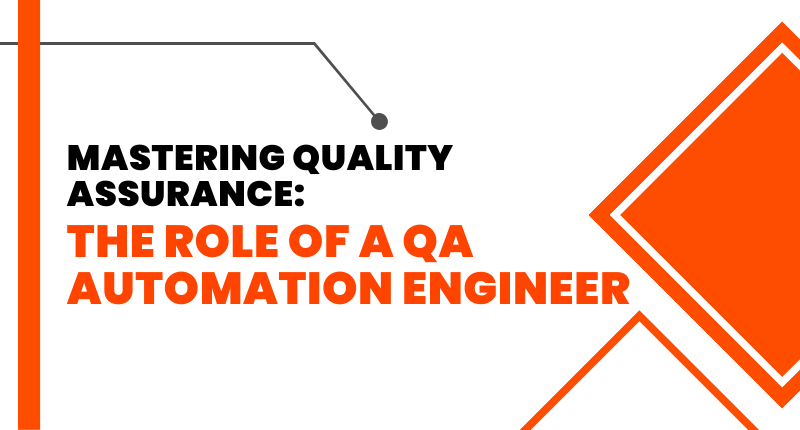In today’s fast-paced digital landscape, ensuring high-quality software products is essential for businesses to thrive. Quality Assurance (QA) plays a crucial role in this process, and with the increasing complexity of software systems, the demand for skilled QA professionals has skyrocketed. One such specialized role that has gained prominence is that of a QA Automation Engineer. In this article, we will explore the responsibilities, skills, and significance of a QA Automation Engineer in ensuring top-notch software quality.
1. The Evolution of Quality Assurance:
Quality Assurance has evolved significantly over the years. Initially, manual testing was the primary method used to validate software functionality. However, as technology advanced and software systems became more intricate, manual testing proved to be time-consuming, error-prone, and inefficient. This paved the way for the emergence of QA automation.
2. Understanding the Role of a QA Automation Engineer:
A QA Automation Engineer is responsible for designing, developing, and implementing automated tests to ensure software functionality, reliability, and performance. They collaborate closely with the development team, product managers, and other stakeholders to identify test requirements and create comprehensive test plans. The key focus of a QA Automation Engineer is to streamline the testing process by leveraging automation tools and frameworks.
3. Essential Skills for a QA Automation Engineer:
To excel in this role, a QA Automation Engineer needs to possess a diverse skill set. Here are some of the essential skills required:
a. Programming Knowledge: Proficiency in programming languages such as Java, Python, or C# is crucial for developing automated test scripts.
b. Test Automation Tools and Frameworks: Familiarity with popular automation tools like Selenium, Appium, or Cypress, along with testing frameworks such as JUnit or TestNG, is vital for efficient test automation.
c. Understanding of SDLC and Testing Methodologies: A solid understanding of the Software Development Life Cycle (SDLC) and different testing methodologies, including Agile and DevOps, helps in aligning testing efforts with the development process.
d. Analytical and Problem-Solving Skills: A QA Automation Engineer should possess strong analytical and problem-solving skills to identify test scenarios, troubleshoot issues, and optimize test execution.
4. Benefits of QA Automation
Implementing QA automation brings numerous benefits to the software development process. Let’s explore some of the key advantages:
a. Improved Efficiency:
Automation significantly improves testing efficiency by allowing faster and more extensive test execution. Automated tests can be run repeatedly and quickly, eliminating the need for manual intervention. This not only saves valuable time but also enables QA teams to focus on more complex and critical testing tasks. With automation, testing efforts can be scaled up or down as needed, ensuring efficient resource utilization.
b. Increased Test Coverage:
Manual testing can be limited in terms of the number of test scenarios and combinations that can be effectively tested. QA automation enables broader test coverage by executing tests across different platforms, operating systems, and browsers. Automated tests can simulate a wide range of user interactions and test cases, ensuring comprehensive coverage of the software’s functionality. This helps identify potential issues or bugs that might go unnoticed with limited manual testing.
c. Reliable and Consistent Results:
Human error is an inherent risk in manual testing. Automated tests deliver reliable and consistent results by eliminating the variability caused by human intervention. Automated tests follow predefined scripts and execute test cases accurately, ensuring the same steps are performed consistently every time. This reliability is particularly valuable when performing repetitive tests, reducing the chances of overlooking critical issues due to fatigue or oversight.
d. Early Bug Detection:
QA automation integrated into the development pipeline allows for early bug detection. By running automated tests during the development process, QA Automation Engineers can identify and address issues in the early stages. This proactive approach helps minimize the impact and cost of bugs that could otherwise be discovered later in the software development lifecycle. Early bug detection enables faster bug resolution, leading to more efficient development cycles and improved software quality.
e. Regression Testing:
Software systems evolve and change over time, which necessitates regression testing to ensure that new updates or modifications do not introduce unintended side effects or break existing functionality. Manual regression testing can be time-consuming and error-prone. With automation, regression testing becomes much more efficient and reliable. Automated test suites can be executed after each code change or deployment, enabling rapid identification of regression issues and ensuring that existing functionality remains intact.
f. Cost and Time Savings:
Implementing QA automation can lead to significant cost and time savings in the long run. Automated tests can be executed simultaneously across multiple configurations, reducing the time required for testing cycles. By minimizing manual efforts, organizations can allocate resources more efficiently and reduce the overall testing effort. Moreover, the early bug detection enabled by automation helps avoid costly fixes and reduces the risk of critical issues in production.
5. Collaboration and Communication:
Effective collaboration and communication are paramount for a QA Automation Engineer. They work closely with developers, QA teams, and other stakeholders to ensure that testing aligns with the development goals. Clear communication helps in understanding project requirements, resolving issues, and maintaining a smooth development process.
Conclusion:
As software systems become increasingly complex, the role of a QA Automation Engineer becomes indispensable in ensuring high-quality software products. With their expertise in automation tools, programming languages, and testing methodologies, QA Automation Engineers streamline the testing process, enhance efficiency, and contribute to the overall success of software development projects. Embracing automation in QA is the way forward, and organizations that invest in skilled QA Automation Engineers stand to gain a competitive advantage in delivering robust, reliable, and user-centric software solutions.




